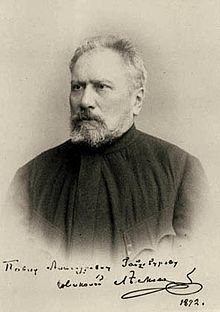The pen
The pen ( Russian Загон , Sagon ) is a story by the Russian writer Nikolai Leskow , which appeared in the November 1893 edition of the literary supplement to Knischki Nedeli ( weekly booklet ) .
overview
One month after the text was published, Tolstoy wrote to his friend Leskov: “I liked it, but especially that it was pure truth, not an invention. Truth can be made just as interesting ... [as] fiction ... ". The title pen is a synonym for Russia, which was industrially backward compared to Western Europe in 1893. Even more - the country is isolating itself. A Russian industrialist proclaimed at the end of September 1893: "Russia must reflect on itself, forget the existence of the other ... states ...".
The text can be read as a collection of anecdotes. In addition to the encirclement of the tsarist empire, which the eponymous metaphor suggests, Leskow also offers stories about life and goings-on in the Estonian governorate : In the Saint Petersburg seaside resort of Merrekül on the Gulf of Finland between Polangen and Narva, there are some Russian originals among Russians , Estonians and Germans . In general, the reader is entertained with a number of humorous passages. Leskow writes that the Estonians are "very economical, yes stingy ...".
content
The Russians believe that, as managers of Europe 's breadbasket , they can safely put aside von Thünen's edition of “The isolated state in relation to agriculture and national economy”, which was specially edited for Russian readers. Logically, the Englishman Scott then fails with the introduction of the modern Smilean plow in Russia. The Russian peasants stick to their hook plow .
Regarding the originals in Merrekül: The unpopular St. Petersburg religion teacher Alexander Gumilewski was transferred to the province as a punishment. The Merrek students do not want to hear his teachings either. Before he can complete the building of the - by Merrekul standards - magnificent church, compassionate Petersburg superiors bring him back to the Russian metropolis Neva . Gumilewski is allowed to accompany the dying in a St. Petersburg hospital chapel. But, Leskov scoffs, Gumilewski's admonitions could be used by the deceased in their “new existence” as early as possible.
This is followed by a few trickery pranks by the good-for-nothing Merrekul Jefim Wolkow - called Mifim, who died there in the late summer of 1893 after he had really drunk himself again in the cellar of the wine merchant Swonkow. Mifim shirked the military during his lifetime by passing the mental illness exam. Back home, he cures bewitched cattle and always lets a cow sink into the moor. The farmer pays the rogue to find his animal at the last moment. At the church gate Mifim then drives out old beggars and the dog of one of the omnipresent general wives on the occasion of the church service with his long whip, thus retains the “privilege as a beggar” in front of the church and can count towards the “staff of the church”. In summer, Mifim blesses an unmarried daughter of one of the general wives waiting in Merrekül in a forest clearing. Indeed, the blessed girl gets married the following winter.
reception
According to Setschkareff, the Merrek students are spa guests, i.e. those general wives who see the deceiver Mifim as a saint, are just as uneducated as the Russian farmers. In addition, Tolstoy's influence on Leskov's style can be read from some text passages. Setschkareff "praises" Leskow: his "incoherent sketches" captivated even without a plot.
literature
German-language editions
Output used:
- The pen. German by Georg Schwarz. P. 287-325 in Eberhard Reissner (Ed.): Nikolai Leskow: Collected works in individual volumes. The valley of tears. 587 pages. Rütten & Loening, Berlin 1973 (1st edition)
Secondary literature
- Vsevolod Sechkareff : NS Leskov. His life and his work. 170 pages. Verlag Otto Harrassowitz, Wiesbaden 1959
Web links
- The text
- Entry in the Laboratory of Fantastics (Russian)
- Entry in WorldCat
Individual evidence
- ↑ Russian Книжки Недели , monthly literature supplement to the Sankt Petersburg weekly newspaper Неделя ( The Week , 1866–1901)
- ^ Reissner quotes Tolstoy in the follow-up to the edition used, p. 563, 2nd Zvo
- ↑ Edition used, p. 287, 10th Zvu
- ↑ Edition used, p. 310, 9. Zvo: Seebad Merrekül (Russian Меррекюль).
- ↑ Edition used, p. 315, 12. Zvo
- ↑ Russian Гумилевский, Александр Васильевич (1830–1869)
- ↑ Setschkareff, p. 119, 23. Zvo to p. 120, 1. Zvu
